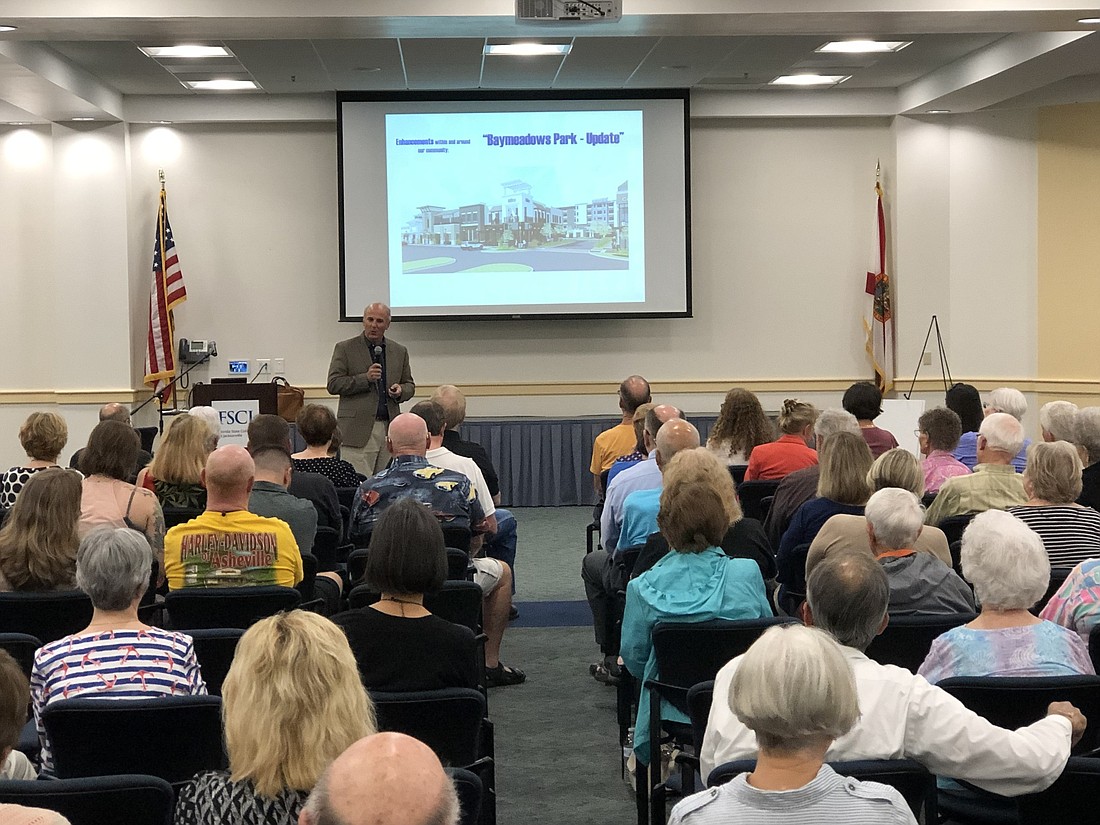
A Dependent Special Taxing District in Baymeadows to pay for repairs of deteriorating privately owned roads and infrastructure could mean up to a $500 annual assessment on single-family homes in the area.
District 11 City Council member Danny Becton detailed his proposed legislation to create the Baymeadows Community Improvement District at a town hall meeting Wednesday.
The district, if approved by council, could add up to a $5,000 assessment on multifamily properties in the neighborhood.
The assessment would be added to property tax bills and would be in addition to homeowners association fees. It would pay for roads, street lighting and stormwater drainage projects.
It would be the first time a private Jacksonville community used Florida’s dependent special district statute for infrastructure repairs.
The district would collect the money for the neighborhoods to execute projects in the Baymeadows Community Plan that was approved by council in 2014.
At the town hall meeting at Florida State College at Jacksonville’s Deerwood Center, Becton urged Baymeadows residents — represented by nine homeowners associations — to look at the area as a single entity.
“We’re all connected,” Becton said. “One of the other things I’ll share with you is there are going to be folks — neighborhoods — that are going to benefit more than others.”
Becton told the group that “you’re, ultimately, going to be the one to decide whether the council passes it or not.”
An 11-member Baymeadows Community Council drafted the plan and commissioned the feasibility study for the community improvement district.
Its report, completed May 14, identified $4.7 million in immediate capital improvement needs. The most expensive projects are $1.37 million for roadway, $1.8 million in street lighting and $700,000 for stormwater and drainage.
The study estimates the district’s administrative and operating costs would be $218,210 annually for office expenses, landscaping, water quality, energy and park services.
It was the new assessment that drew the most discussion from residents. Becton showed a breakdown of the estimated annual and monthly fees for residential and commercial property owners in the district.
Residential
• Single-family/duplexes — $500 cap, $25 per month
• Townhomes/condos — $500 cap, $25 per month
• Multifamily — $5,000 cap, $250 per month
• Owners associations — $2,500 cap, $125 per month
Commercial
• Suites —$500 cap, $25 per month
• Townhomes/Condos — $750 cap, $38 per month
• Business, single standalone — $1,000 cap, $50 per month
• Owner association —$2,500 cap, $125 per month
The formula used to determine the assessments is under review.
The district will be divided into four regions.
The largest include 500 residential units and 547 homes under development by Texas-based homebuilder D.R. Horton at the former Baymeadows Golf Course.
It also impacts the Cypress Point Executive Center, four other business properties, St. Johns Plantation Apartments and The Avenues Apartments.
The three smaller regions encompass mostly commercial properties including the $15 million mixed-use Baymeadows Park under development by Joyce Development Group LLC.
Douglas Adams owns a townhome in the Las Prados neighborhood. He and others questioned the fairness of the formula used to calculate the assessment caps when comparing residential payments versus commercial.
He argued that the 900-unit Baymeadows apartments would be capped at $5,000 per year, while his 125-unit townhome neighborhood would collectively pay more than $60,000 annually.
Patrick Heatherington, a homeowner in the Baymeadows Linkside neighborhood, said he supported the joint-BCC/Becton plan.
He was concerned that 40 years of deferred maintenance on Baymeadows infrastructure could result in city code violations, resulting in special assessments. He foresees lower resale values without the improvements and competition from the D.R. Horton development — a neighborhood with new streets, sidewalks, curbs and gutters.
“A homeowners association trying to borrow money to improve roads, it ain’t going to happen,” Heatherington said. “I think we should talk about the other side — what the cost really is if you don’t do this.”
Becton will introduce the legislation in mid-July after the council’s summer break. He urged supporters and detractors to attend public hearings and make suggestions to improve the bill.
“If there is a mutiny tonight, if 100 people walk out this door and say, ‘Heck no,’ and use the double hockey sticks, this might get pushed to August to get some explanations or it might get pushed to never,” Becton said. “But at some point, we have to fish or cut bait on this.”
Becton said he intends to post the draft legislation on his website for Baymeadows residents to review.
The plan has been in works for two years. Wednesday was the first public town hall on the Baymeadows Community Improvement District since July.
BCID Governing Board
Becton called the public structure of the Baymeadows Community Improvement District a “mini-municipality.” How it would be governed was another part of his presentation.
The legislation will call for a seven-member board of supervisors — four group seats with two-year terms and three at-large seats with four-year terms.
The board would be subject to Florida Sunshine Law and would manage and appropriate the money raised by the assessments.
Becton also recommends the city’s District 11 representative act as an ex officio representative to the board.
The first governing board would be appointed in the legislation. Every subsequent board, like community development districts, will be elected by residents. Supervisor hopefuls, Becton said, will campaign and be on the November 2020 ballot.
The board, with the legal authority to purchase land and issue bonds for projects, would take on bigger projects than the nine homeowners associations can handle individually, he said.
Becton said the legislation would allow the board to employ engineers, attorneys, accountants and consultants on behalf of the residents.
The board’s budget will require annual council approval and Becton said the legislation will call periodically for a review of assessments for inflation, but any change would require a vote of the supervisors.